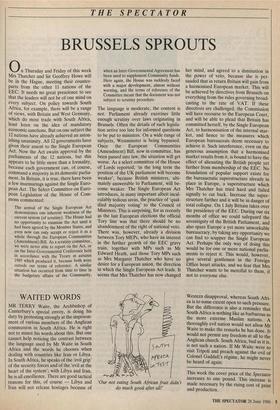THE SPECTATOR
BRUSSELS SPROUTS
n Thursday and Friday of this week Mrs Thatcher and Sir Geoffrey Howe will be in the Hague, meeting their counter- parts from the other 11 nations of the EEC. It needs no great prescience to see that the leaders will not be of one mind on every subject. On policy towards South Africa, for example, there will be a range of views, with Britain and West Germany, which do most trade with South Africa, least keen on the idea of mandatory economic sanctions. But on one subject the 12 nations have already achieved an aston- ishing unanimity. All 12 governments have given their assent to the Single European Act. Now the Act awaits approval by the parliaments of the 12 nations, but this appears to be little more than a formality, because each government can, of course, command a majority in its domestic parlia- ment. In Britain, it is true, there have been a few murmurings against the Single Euro- pean Act. The Select Committee on Euro- pean Legislation of the House of Com- mons commented:
The arrival of the Single European Act demonstrates one inherent weakness of the current system (of scrutiny). The House had no opportunity to examine the Act until it had been agreed by the Member States, and even now can only accept or reject it as a whole through the European Communities (Amendment) Bill. As a scrutiny committee, we were never able to report on the Act, or on the Inter-Governmental Conference held in accordance with the Treaty in autumn 1985 which produced it, because both were outside our terms of reference. A similar situation has occurred from time to time in the budgetary affairs of the Community, when an Inter-Governmental Agreement has been used to supplement Community funds. Here again, ihe House was suddenly faced with a major development, almost without warning, and the terms of reference of the Committee meant that the document was not subject to scrutiny procedure.


















































 Previous page
Previous page